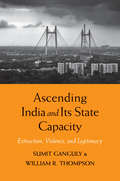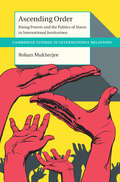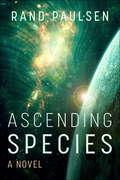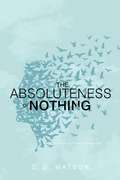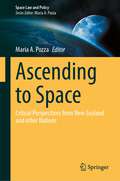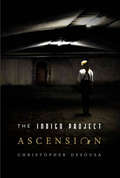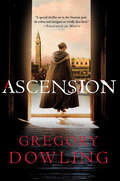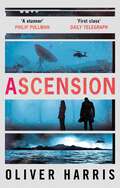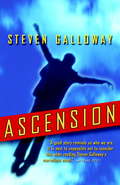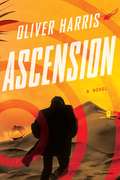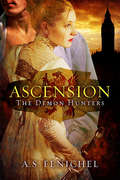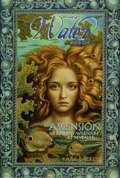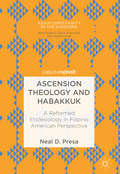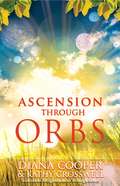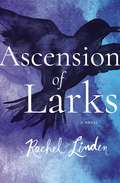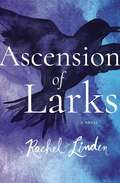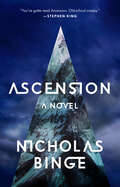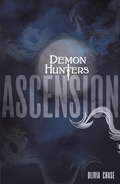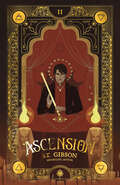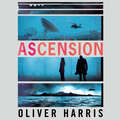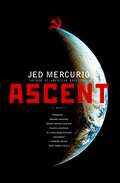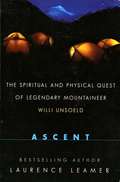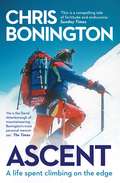- Table View
- List View
Ascending India and Its State Capacity: Extraction, Violence, and Legitimacy
by William R. Thompson Sumit GangulyA comprehensive and revealing account of the ongoing struggles and instability of India's political and economic institutions India's ascent as a formidable power on the world stage and its geopolitical ramifications have received much attention in recent years. This comprehensive study by Sumit Ganguly and William Thompson, two highly distinguished scholars of political science and international relations, delves into the intricate inner workings of this great Asian nation to reveal an Indian state struggling to maintain national security, domestic order, and steady fiscal growth despite weaknesses in its economic and political institutions. The authors' sobering account questions India's perceived strengths and domestic and foreign policy initiatives, while focusing on the South Asian giant's infrastructural and economic growth problems, opposition to reform, and other important hurdles the nation has faced and will continue to face over the coming decade and beyond.
Ascending Order: Rising Powers and the Politics of Status in International Institutions (Cambridge Studies in International Relations)
by Rohan MukherjeeWhy do rising powers sometimes challenge an international order that enables their growth, and at other times support an order that constrains them? Ascending Order offers the first comprehensive study of conflict and cooperation as new powers join the global arena. International institutions shape the choices of rising states as they pursue equal status with established powers. Open membership rules and fair decision-making procedures facilitate equality and cooperation, while exclusion and unfairness frequently produce conflict. Using original and robust archival evidence, the book examines these dynamics in three cases: the United States and the maritime laws of war in the mid-nineteenth century; Japan and naval arms control in the interwar period; and India and nuclear non-proliferation in the Cold War. This study shows that the future of contemporary international order depends on the ability of international institutions to address the status ambitions of rising powers such as China and India.
Ascending Species: A Novel
by Rand PaulsenDelve into the lives of four remarkable species in an epic journey across time! This historical archive has been translated for the humans of Earth-but within, there are no humans! In this epoch-spanning chronicle of evolutionary proportions, four distinct intelligent species, on a planet not unlike Earth, each get their time on the stage of civilization to showcase their innate strengths, their inevitable flaws, and their unique determination to surmount the massive obstacles that not only their neighboring species, but the planet itself, ceaselessly has to offer. The lives and cultures of the powerful reptilian Serpils and the armadillo-like Drels are reflective of their natures-what's normal to them may seem very strange to us. The ways of the Geminy, being primates, may seem similar to humans, but do not be mistaken. Creative and friendly, the Tubells are a four-eyed species of cephalopods who have a unique perspective after having adapted to live on land. From their humble, hard-scrap origins to their hard-won formation of global civilizations-and beyond to the edge of space-the peculiar and disparate societies animating Ascending Species lay the ground for a fun, fast-paced experience full of nail-biting challenges, complex conflicts, heart-wrenching struggles, and heart-warming achievements. As to which species will survive the whims of time . . . only time will tell.
Ascending the Boneyard
by C. G. WatsonDonnie Darko meets The Matrix in this mind-bending and captivating mystery about one teen's surreal experiences after surviving a major trauma.Everything's a battle. Sometimes life gets too real, and Caleb Tosh has taken one hit too many. First, there was the accident that changed everything for Tosh's younger brother. Now his mom has left. All the pain, the grief and loss, have finally pushed Tosh over the edge. If only he could have a do-over. Wipe his reality. Start fresh. Maybe he could fix all of his mistakes and everything would be different. Tosh immerses himself in the complex missions from the game he obsessively plays, The Boneyard. The game bleeds into the dark nature of his everyday life, folding reality into surreality until it's impossible to separate one from the other. Tosh is desperate to Ascend, to reach the next level, to become Worthy. Readers are brought on a one-of-a-kind, absorbing journey where no one can say what is real and what isn't--right up until the shocking, yet deeply powerful conclusion.
Ascending to Space: Critical Perspectives from New Zealand and other Nations (Space Law and Policy)
by Maria A. PozzaThis book explores multidisciplinary perspectives on critical issues in space from the viewpoints of New Zealand and other nations. It brings together the topics examined at the Otago Foreign Policy School 2022 by both domestic and international experts in the area of space, and includes the opening address on space policy delivered by the Minister of Foreign Affairs. This book takes a multidisciplinary approach to New Zealand’s growing space sector in conjunction with other nations’ perspectives on space. It encompasses space science, military and defence matters, space tourism and astronaut rescue, and international legal and policy frameworks, while taking into account future considerations. Readers such as academics, students, policy advisers, diplomats, government officials and others engaged in the field of space will find value in this book. It will appeal to think tanks and international institutions grappling with the complexities that are presented by the outer space domain.
Ascension
by Christopher De SousaMORTAL INSTRUMENTS MEETS EGYPTIAN MYTHOLOGY Katherine Munroe is most definitely not your typical teen and just about the only thing typical are her high school boy problems. She does however have quite the amazing ability to draw and much to her own confusion she accidentally lights things on fire. Even more plaguing are her reoccurring hallucinations, always thinking she is losing it, or so she thought. But then, after a horrific attack on her life resulting in the death of her father, she realizes there is something...more. Anzu, a winged beast of a different sort, and subject of Katherine's hallucinations, saves her and become's her guardian. Bereaved over the loss of her father, she quickly discovers the unthinkable. Her entire township, as she knew, is a secret government experiment. And her father? Well, he was more of a caretaker since her birth. This rogue operation, better known as Project Indigo, is at war with a corrupted race of aliens. In order to save the world and defeat The Corrupted they need the help of Katherine. Through special training and the discovery of her abilities, Katherine and Project Indigo battle the entities set to destroy them while she discovers the truth about her family, her lineage, and her future.
Ascension
by Gregory DowlingWhen a young tour guide, Alvise Marangon, offers to help an English Grand Tourist, little does he know that it will lead to his being embroiled in blackmail and conspiracy. To add to his woes, he is then forcibly recruited into the city's powerful secret service to investigate a murder case. A reluctant spy he may be , but he is a gifted one. Amidst the world of gambling dens and courtesans, something momentous is being planned for the Feast of the Ascension, Venice's most important and spectacular holiday, and it seems that only Alvise can prevent the day turning into bloody mayhem.
Ascension
by Oliver Harris'Oliver Harris's Ascension is a stunner. What a pleasure it is to read a book with a powerful story, an unusual and fully realised setting, a convincing hero, all written in a style of luminous clarity' Philip PullmanAscension: the most remote island in the world... Elliot Kane, former spy, trying to leave the world of espionage behind. Kathryn Taylor: a stalled career in MI6, running the South Atlantic desk. Rory Bannatyne: covert technical specialist. Dead, apparently of suicide. Three friends from a mission many years ago reconnect when one of them dies on Ascension Island. Rory Bannatyne had been tasked with tapping a new transatlantic data cable, but a day before he was due to return home he is found hanged. When Kathryn Taylor begs Kane to go over and investigate, he can't say no, but it's an uneasy reintroduction to the intelligence game. Ascension is a curious legacy of England's imperial past. Only employees and their families are allowed to live there. It's home to several highly-classified government projects, a British and American military base, and forty dead volcanic cones. Entirely isolated from the world, the disappearance of a young girl at the same time as Rory's death means local tensions are high. Elliot needs to discover what happened to her as well as to Rory. But the island contains more secrets than even the government knows, and it's not going to give them up without a fight.
Ascension
by Steven GallowayThe acclaimed author of Finnie Walsh turns from small-town hockey to the extraordinary intrigues of circus life during the heyday of the Big Top through the story of Salvo Ursari, undisputed master of the high wire.As the novel opens, it is the summer of 1976. Salvo is 66 years old and has decided he can never retire. Already famous thanks to his days in an American circus, he has made a living in recent times performing solo walks of extraordinary difficulty. And so he finds himself attempting to accomplish the most difficult feat of his career: to walk a wire strung between the twin towers of the World Trade Center, 1350 feet from the ground.Transylvania in 1919 is a place of poverty and persecution for the Rom people. Salvo follows his father to a village church, where the senior Ursari -- the only man who volunteers for the task -- is to climb the steeple to replace a large iron crucifix that had been removed for safe-keeping during the war. He restores the cross, but it is not properly attached and as they are leaving, it falls, killing a priest. When the villagers exact their revenge, Salvo's parents are killed and he is separated from his brother and sister. Thus begins nearly a lifetime of being forced to flee from suspicion and misfortune that takes the reader from Europe to the US to British Columbia's Fraser Valley and back to Manhattan.Ascension combines powerful storytelling -- including stories of the Romany people, poverty-stricken but resourceful, and rich in legend -- with great surprise and originality; Steven Galloway makes it clear why he is one of the hottest young writers in Canada today.Excerpt from Ascension"Once a newspaper man had asked him what it felt like to walk high above the crowd, with death looming beneath you and success a long way off on the other platform. Salvo had told the man that it was like being a bird, an eagle, but he knew that wasn't true at all. He was a man, nothing more. Still, he was a man who dared do things other men watched and admired and were jealous of. He walked for these people as much as for anyone. But today he was walking only for himself. That was the difference with these solo walks. When he was among them, he was one of them, but here he is timeless, one man on a wire far above it all, in a separate place. He was not free, but he was as free as he would ever be."From the Hardcover edition.
Ascension (An Elliot Kane Thriller)
by Oliver HarrisBritish spy Elliot Kane is forced out of semi-retirement to investigate a colleague&’s suspicious death on Ascension Island, a remote and rocky outpost of the British military in the middle of the Atlantic.Despite uncovering a deep plot to incite a new world war, Elliot Kane has been on probation with the service since his misadventures in Kazakhstan. Having taken up a job teaching college literature and linguistics, he surprisingly enjoys living a conventional life and wonders if he would even go back to spycraft. Then a colleague from an ages-ago mission reaches out with a request. One of her tech specialists was on a long-term mission, in deep cover, but has suddenly killed himself. The agency is afraid to finish this vital mission without knowing what prompted this seemingly healthy man to take his own life. The carrot in this offer is helping his old friend; the stick is a worse punishment from the Agency if he doesn&’t comply. So Elliott poses as an academic researcher and heads to one of the most remote places on the planet, Ascension Island. Arriving on a rocky, barely livable island located in the Atlantic Ocean, halfway between Brazil and Angola, Kane is unsure whom to trust and why this lonely outpost is so important to the British military . . . until he uncovers dangerous secrets that lead straight back to London&’s highest offices.
Ascension (An\elliot Kane Thriller Ser.)
by Oliver Harris'Oliver Harris's Ascension is a stunner. What a pleasure it is to read a book with a powerful story, an unusual and fully realised setting, a convincing hero, all written in a style of luminous clarity' Philip PullmanAscension: the most remote island in the world... Elliot Kane, former spy, trying to leave the world of espionage behind. Kathryn Taylor: a stalled career in MI6, running the South Atlantic desk. Rory Bannatyne: covert technical specialist. Dead, apparently of suicide. Three friends from a mission many years ago reconnect when one of them dies on Ascension Island. Rory Bannatyne had been tasked with tapping a new transatlantic data cable, but a day before he was due to return home he is found hanged. When Kathryn Taylor begs Kane to go over and investigate, he can't say no, but it's an uneasy reintroduction to the intelligence game. Ascension is a curious legacy of England's imperial past. Only employees and their families are allowed to live there. It's home to several highly-classified government projects, a British and American military base, and forty dead volcanic cones. Entirely isolated from the world, the disappearance of a young girl at the same time as Rory's death means local tensions are high. Elliot needs to discover what happened to her as well as to Rory. But the island contains more secrets than even the government knows, and it's not going to give them up without a fight.
Ascension (Demon Hunters #1)
by A. S. FenichelThe Demon Hunters, #1 When demons threaten London, Lady Belinda answers the call. Lord Gabriel Thurston returns home from war to find his fiancée is not the sweet young girl he left behind. She's grown into a mysterious woman who guards her dark secrets well. When he sees her sneaking away from a ball, he's convinced it's for a lover's rendezvous. Following her to London's slums, Gabriel watches in horror as his fiancée ruthlessly slay a man. Lady Belinda Carlisle's only concern was her dress for the next ball--until demons nearly killed her and changed everything. A lady by day, and a demon hunter by night, she knows where her duty lies. Ending her betrothal is the best way to protect Gabriel from death by a demon's hand. Gabriel soon realizes, like him, Belinda has been fighting for her country. He joins in the fight, determined to show her that their love can endure, stronger than ever.86,825 Words
Ascension (Water Series #1)
by Kara DalkeyThe sea is the birthplace of legends. Nia, a young mermyd of the Bluefin clan, has had one wish all her life -- to be an Avatar in her beloved home of Atlantis. The ten Avatars rule the beautiful and peaceful undersea city alongside the ancient Farworlders, whose magic keeps their world alive. To be an Avatar is an honor and a great responsibility, and Nia dreams of taking her place among the noble ten. Now, at sixteen, Nia has a chance to see her dream come true. Atlantis is choosing its next Avatar, and Nia knows she is supremely qualified. But there is something Nia doesn't know -- if she gets her heart's desire, it could mean the end of her treasured world of Atlantis forever.
Ascension Theology and Habakkuk: Reformed Ecclesiology In Filipino American Perspective (Asian Christianity In The Diaspora )
by Neal D. PresaThis book describes Reformed ecclesiology through the lived faith of the Filipino American Christian diaspora. It proposes a contextual, constructive ecclesiology by engaging with the Presbyterian/Reformed theological tradition’s understanding of the ascension of Jesus Christ with the Old Testament book of Habakkuk as a conversation partner.
Ascension Through Orbs
by Diana Cooper Kathy CrosswellFeaturing a wealth of additional material, this book explains the meaning and the importance of orbs-the physical presence of angels found in digital photographs-in a wider and more advanced context. With nearly 50 photographic examples accompanied by meditations to allow the energy of the orbs to be more fully absorbed, this advanced tool for ascension explores spirit guides and the angelic hierarchy in greater depth, including the powers, the chakras, the archangels, the Lords of Karma, and the Ascension Masters.
Ascension of Larks
by Rachel LindenWhen globetrotting photographer Magdalena Henry loses the only man she’s ever loved, she risks her stellar career to care for his widow and young children on a remote island in the Pacific Northwest. Free-spirited and fiercely independent, Maggie adores her life of travel and adventure. But she has a secret. She can’t let go of her first and only love, renowned architect Marco Firelli, now married to her best friend Lena.When Marco drowns in a kayaking accident, Maggie rushes to the Firelli family’s summer home on San Juan Island. Once there she discovers that Marco was hiding something that could destroy his family. As fragile, perfectionistic Lena slowly falls apart, Maggie tries to provide stability for Marco and Lena’s three young children.When Maggie is offered a once-in-a-lifetime chance to compete in the world’s most prestigious photography competition, she thinks she’s found the answer to their problems. Then Lena makes a choice with unexpected and devastating consequences, forcing Maggie to grapple with an agonizing decision. Does she sacrifice the golden opportunity of her career or abandon the Firellis just when they need her the most?Gradually the island begins to work its magic. A century-old ritual to beckon loved ones home offers hope in the midst of sorrow. And a guilt-ridden yet compelling stranger hiding on the island may offer Maggie a second chance at love, but only if she can relinquish the past and move forward to find joy in unexpected places.
Ascension of Larks
by Rachel LindenWhen globetrotting photographer Magdelina Henry loses THE ONLY MAN SHE'S EVER LOVED, SHE RISKS HER STELLAR CAREER TO CARE FOR HIS WIDOW AND YOUNG CHILDREN ON A REMOTE ISLAND IN THE PACIFIC NORTHWEST. Free-spirited and fiercely independent, Maggie adores her life of travel and adventure. But she has a secret. She can't let go of her first and only love, renowned architect Marco Firelli, now married to her best friend Lena. When Marco drowns in a kayaking accident, Maggie rushes to the Firelli family's summer home on San Juan Island. Once there she discovers that Marco was hiding something that could destroy his family. As fragile, perfectionistic Lena slowly falls apart, Maggie tries to provide stability for Marco and Lena's three young children. When Maggie is offered a once-in-a-lifetime chance to compete in the world's most prestigious photography competition, she thinks she's found the answer to their problems. Then Lena makes a choice with unexpected and devastating consequences, forcing Maggie to grapple with an agonizing decision. Does she sacrifice the golden opportunity of her career or abandon the Firellis just when they need her the most? Gradually the island begins to work its magic. A century-old ritual to beckon loved ones home offers hope in the midst of sorrow. And a guilt-ridden yet compelling stranger hiding on the island may offer Maggie a second chance at love, but only if she can relinquish the past and move forward to find joy in unexpected places. Rachel Linden is a novelist and international aid worker whose adventures living and traveling in fifty countries around the world provide excellent grist for her stories. She holds an MA in Intercultural Studies from Wheaton College, a BA in Literature from Huntington University, and studied creative writing at Oxford University during college. Currently, Rachel splits her time between Seattle, Washington and Budapest, Hungary where she lives with her husband and two children. Rachel enjoys creating stories about hope and courage.
Ascension: A Novel
by Nicholas BingeNAMED A BEST BOOK OF THE YEAR BY VULTURE!"You've gotta read Ascension by Nicholas Binge. Old-school creepy. . .five-star horror."—Stephen King"Smartly paced, deploying twists and turns strategically to keep the reader moving. . . The ideas are big and the journey is a whole lot of fun." —The New York Times"[An] excellent page-turner. . . a macabre, escapist pleasure for the thoughtful set.&”—The Wall Street JournalA mind-bending speculative thriller in which the sudden appearance of a mountain in the middle of the Pacific Ocean leads a group of scientists to a series of revelations that challenge the notion of what it means to be humanThe only way out is up. . . An enormous snow-covered mountain has appeared in the Pacific Ocean. No one knows when exactly it showed up, precisely how big it might be, or how to explain its existence. When Harold Tunmore is contacted by a shadowy organization to help investigate, he has no idea what he is getting into as he and his team set out for the mountain. The higher Harold&’s team ascends, the less things make sense. Time moves differently, turning minutes into hours, and hours into days. Amid the whipping cold of higher elevation, the climbers&’ limbs numb and memories of their lives before the mountain begin to fade. Paranoia quickly turns to violence among the crew, and slithering, ancient creatures pursue them in the snow. Still, as the dangers increase, the mystery of the mountain compels them to its peak, where they are certain they will find their answers. Have they stumbled upon the greatest scientific discovery known to man or the seeds of their own demise? Framed by the discovery of Harold Tunmore&’s unsent letters to his family and the chilling and provocative story they tell, Ascension considers the limitations of science and faith and examines both the beautiful and the unsettling sides of human nature.
Ascension: Book 2 (Demon Hunters #2)
by Olivia ChaseFor fans of Cassandra Clare and Buffy the Vampire Slayer, the second book in this kick-ass new series will keep you on the edge of your seat ...Diana, Minerva and Vesta are Demon Hunters, gifted with amazing powers. They can see truth with the touch of the hand, break down solid walls and shoot lightning from their fingertips ... basically all the things you could want in the battle against supernatural evil. When an eerie fog cloaks Edinburgh and the girls find a boy, bloodied and confused, they suspect a demon is up to no good. Before they can even grab their weapons, they're plunged into a fight agianst an ancient foe. Will the united strength of their Trinity be enough to keep them alive?With new faces, an old flame and one seriously blood-thirsty demon, things are about to get interesting ...
Ascension: Book II in The Summoner's Circle
by S.T. GibsonFrom the international bestselling author of Evocation comes it's hotly anticipated and spellbinding sequel, where Rhys steps into his new role as High Priest. A magical read for lovers of traditional urban fantasy.Ever since Rhys McGowan was a boy, he's only wanted two things: power and love. Now, as High Priest of Boston's premiere Secret Society, husband to his adoring witch wife Moira, and partner to David - his psychic rival-turned-boyfriend, Rhys is finally at peace. But when a strange ritual rocks Boston's occult community, and opens the Society up to sabotage, Rhys delves even deeper into the dark world of demon-summoning. He's used to carrying the weight of the world on his shoulders, but the strain of managing so many spirits (not to mention the stress of his loved ones exploring other people) will push him to the brink. As heaven and hell play tug of war for Rhys' soul, he'll have to face the greatest demon of all: his own insatiable ambition.The second book in the bestselling Summoner's Circle series sees beloved characters return for an all new dark and enthralling adventure.
Ascension: an absolutely gripping BBC Two Between the Covers Book Club pick
by Oliver Harris'One of our finest thriller writers' Evening StandardA BBC2 BETWEEN THE COVERS BOOK CLUB PICK 2021'Oliver Harris is always pure quality' Ian Rankin'A fascinating tale of modern espionage in a unique setting' Irish IndependentThree friends from a mission many years ago reconnect when one of them dies in mysterious circumstances on remote Ascension Island. Rory Bannatyne had been tasked with tapping a new transatlantic data cable, but a day before he was due to return home he is found hanged. When Kathryn Taylor, on the South Atlantic MI5 desk, begs ex-spy Elliot Kane to go over and investigate, he can't say no, but it's an uneasy reintroduction to the intelligence game.Entirely isolated from the world, the disappearance of a young girl on the island at the same time as Rory's death means local tensions are high. Elliot needs to discover what happened to her as well as to Rory. But the island contains more secrets than even the government knows, and it's not going to give them up without a fight. WHAT READERS ARE SAYING'Captivating...Gripping, relevant and frenetic. You'll be hard pressed to put this one down for a second' Amazon reader five star review'Stunning spy novel...This is the best of its genre I've read' Amazon reader five star review'A bit like a thinking person's Lee Child' Amazon reader five star review
Ascent
by Jed MercurioThe Sun swings behind the world. Night engulfs him. The dull metal craft plunges through space, its portholes pale beacons containing the silhouette of a man, and the only other lights are the stars themselves. Can one act define a man? Or his country? Ascent is the spellbinding thriller by critically acclaimed British novelist Jed Mercurio. Inspired by the secrets still surrounding the USSR's race against the United States to put a man on the moon, Mercurio asks the chilling question, What if the Americans weren't first? Ascent takes us on the perilous journey of its singular hero, the brave and determined Yefgenii Yeremin. Yefgenii rises from the privation of a Stalingrad orphanage in 1946 to the heights of the cosmonaut corps. During the Korean War he joins an elite Soviet squadron conducting a secret air war against the famous aces of the U. S. Air Force. Dubbed Ivan the Terrible, he amasses more jet kills than any fighter pilot in history, but his feats must remain unknown to his countrymen, his victories un-celebrated. After the war, his achievements are scrubbed from the records and he is exiled to a base above the Arctic Circle, where he flies patrols on the edge of American airspace. There he learns that Yuri Gagarin has become the first man in space, the greatest of all heroes. And then, as America's Apollo astronauts prepare to reach the Moon, he is given a new name and sent into cosmonaut training. Throughout his career, he has craved a place in history, in the climactic clash between the two great powers. At last his country calls him. And somewhere between the Earth and the Moon, Ivan the Terrible finds his mission to create history, to exceed his own life. With one of the most fascinating heroes in recent fiction, Ascent builds a terrifying scenario within the shadowy history of the space race. Haunting, tragic, boldly inventive,Ascent is a tour de force of imagination.
Ascent
by Laurence LeamerWilli Unsoeld, a legend among mountaineers--a man whom Bill Moyers calls one of the few giants he has ever met--fearlessly challenged the world's highest peaks and inspired a generation of climbers with his legacy.Ascent is the story of his life--a thrilling tale of physical and spiritual adventure that captures the hypnotic force behind this extraordinary personality. From his triumphant conquest of Everest's forbidding West Ridge to the tragic loss of his daughter on the treacherous slopes of Nanda Devi to his final, fatal attempt at Mount Rainier, we see Willi as guru and guide, lover of danger and philosopher of risk--a man whose indomitable spirit triggered such devotion that people followed him fearlessly to extraordinary heights and, sometimes, even to their deaths. A dramatic saga of bravery, daring, and the search for spiritual truth, Ascent brilliantly captures the mythic figure of Willi Unsoeld.
Ascent
by Sir Chris Bonington'These well chronicled chapters of Chris’s life read like the pages of an epic saga with all the battle and victory, triumph and tragedy, love and loss one would expect of a mythical hero.' - Leo Houlding 'Bonington was a fabulous and very creative climber. He brought Britain back to being a leading nation of climbers.' - Reinhold MessnerARGUABLY ONE OF BRITAIN'S GREATEST CLIMBERS.Sir Chris Bonington memoir Ascent will chart not only his many triumphs in the climbing world - such as the Eiger, and the Himalaya - but also the struggles he has faced in his life bringing up a family, and maintaining a successful and loving marriage over the decades of travelling the world to conquer mountains. He has undertaken nineteen Himalayan expeditions, including four to Mount Everest which he climbed in 1985 at the age of fifty, and has made many first ascents in the Alps and greater ranges of the world. Along the way we will be fascinated by his many daring climbs, near-death adventures, and the many luminaries of the mountain fraternity he has climbed with, and in some cases - witness their deaths on the rock. The mercurial Dougal Haston; the legendary-tough Don Whillans, the philosopher of the rock Stephen Venables, and the enigmatic Doug Scott, plus many more – this will be an expert’s opinion on the past sixty years of British/ world mountaineering.In Ascent Chris also discusses his first wife (Wendy) who tragically passed away after a long battle with motor neuron disease - his many years of caring for her, and then in his twilight years deciding to return to an iconic climb from his past - The Old Man of Hoy - to summit at the age of 80 years of age. He has now also found love again amidst the sadness and grief. It is a truly inspirational tale. Ascent will be a memoir like no other. Not only a cerebral narrative on what it takes to conquer fear, and learn/ develop the technical skills necessary to climb the world’s greatest peaks; what it is like to survive in places no human being can ultimately reside in for longer than a few months at very high altitude, but also how one overcomes emotional obstacles, too, and rediscover what drives us on to happiness.
